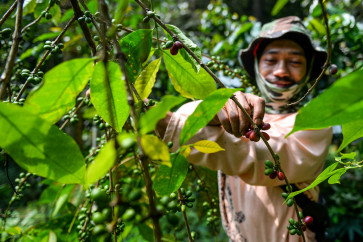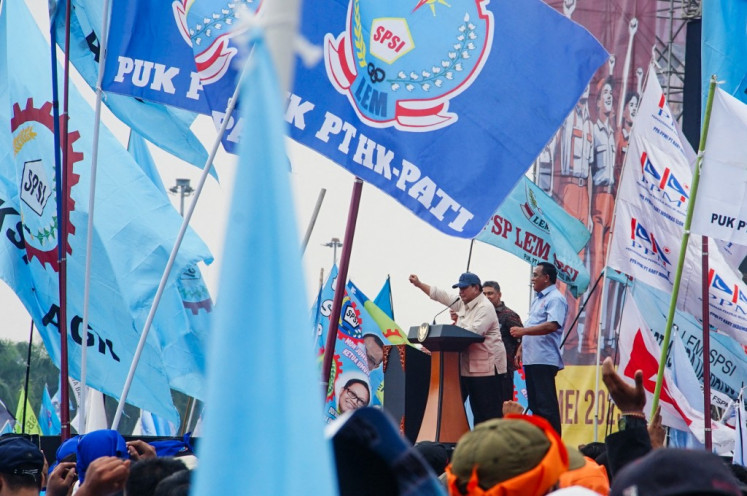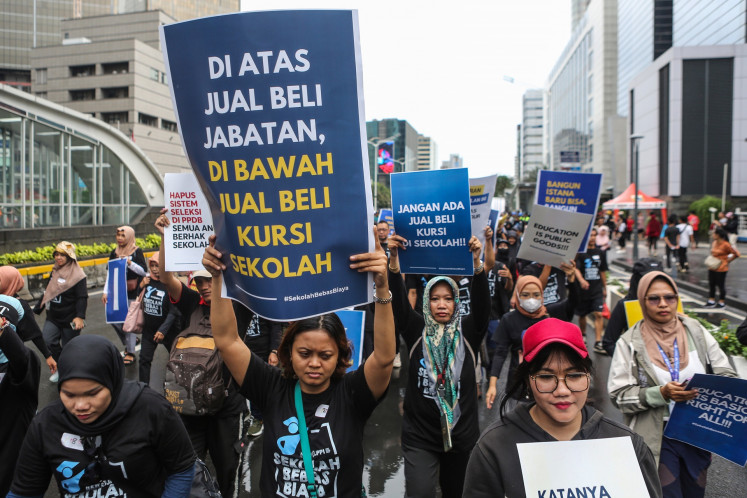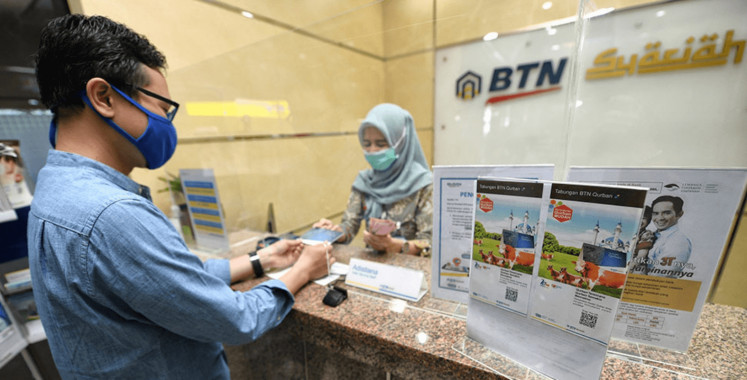Japan's Kishida approaches Jokowi on ore export ban
Japanese Foreign Minister Fumio Kishida met with president-elect Joko âJokowiâ Widodo during a brief visit to Jakarta on Tuesday to call for a review of the countryâs mineral export ban, which has hit the Japanese smelting industry hard
Change text size
Gift Premium Articles
to Anyone

J
apanese Foreign Minister Fumio Kishida met with president-elect Joko 'Jokowi' Widodo during a brief visit to Jakarta on Tuesday to call for a review of the country's mineral export ban, which has hit the Japanese smelting industry hard.
Kishida refused to talk to reporters after the meeting, but Jokowi acknowledged that issues related to the Mining Law ' which stipulates the mineral export ban ' were raised during his discussion with the Japanese minister.
Jokowi said that the Japanese government expected Indonesia's incoming government to further discuss the implementation of the Mining Law, in the hope that the export ban could be eased.
'I have emphasized that I will uphold the law and the Constitution, which mandates that all natural resources should be used for the [benefit of Indonesian] citizens' well-being. However, I welcome them should they want to talk about technicalities,' Jokowi told reporters.
In addition to the Mining Law, Kishida and Jokowi discussed other economic issues including investment opportunities. In the meeting, Japan also pledged that it would assist Indonesia in maritime infrastructure development, as part of the country's efforts to increase and affirm bilateral ties following the end of President Susilo Bambang Yudhoyono's term in October.
In line with the implementation of the 2009 Mining Law, Indonesia banned mineral ore exports beginning January this year. The move was aimed at boosting downstream industry in Indonesia and creating more added value for the mining sector.
The ban has seriously affected smelting industries in Japan and China, which rely heavily on Indonesia's nickel ores. The measure has not only curtailed nickel supplies but has also caused a sharp increase in nickel ore prices.
Japan used to secure nearly 50 percent of its nickel ore needs from Indonesia.
Japan threatened to take Indonesia to the World Trade Organization (WTO) following the announcement of the ban in January. If bilateral talks failed, Japan would be likely to team up with China to challenge Indonesia's export ban, Japanese officials have said.
Indonesian Institute of Sciences (LIPI) economist Latif Adam said the ore export ban had badly affected countries such as Japan and China, the main buyers of the Indonesian mineral ores, especially nickel ore.
He said that the ban's impact on the Japanese smelting industry was quite serious due to the lack of supply. 'The disruption in raw material supply will make the smelting industry in their country a sunset industry and push them to restructure it,' Latif said.
The nickel price rose 1.5 percent to US$18,939 per ton at the London Metal Exchange (LME) on Tuesday, Bloomberg reported. Nickel prices have increased by around 35 percent year-to-date, mainly due to the Indonesian ban.
The director general for minerals and coal at the Energy and Mineral Resources Ministry, R. Sukhyar, said that as a major buyer of Indonesian nickel ore, Japan was informed about the export restriction long before the Mining Law was implemented.
'We disseminated information regarding the law to the Japanese in early 2005. In mid-2005, President SBY proposed the bill to the House of Representatives,' Sukhyar said, adding that the Japanese did not give much response during the discussion.
'The ban will be upheld or the government will violate the law,' he added.
Analysts expect the ban will stay. BNP Paribas strategist Stephen Briggs said as quoted by Bloomberg that Jokowi was not likely to ease the ban.
The ore export ban has encouraged the development of a number of smelters in the country. According to figures from the mineral and coal directorate, 64 smelters are currently in progress, of which 30 are nickel smelters. None of the 30 smelters are backed by Japan. The majority are backed by Chinese investors, according to Sukhyar. (dyl)









